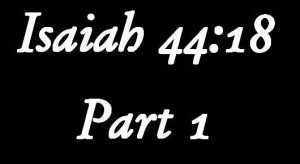 I will never understand why it is so hard to get a good translation of Isaiah 44:18. (Actually, I do understand, but that wouldn’t have made such a catchy first line.)
I will never understand why it is so hard to get a good translation of Isaiah 44:18. (Actually, I do understand, but that wouldn’t have made such a catchy first line.)
Let’s start with these two:
(NIV) They know nothing, they understand nothing; their eyes are plastered over so they cannot see, and their minds closed so they cannot understand
(ESV) They know not, nor do they discern, for he has shut their eyes, so that they cannot see, and their hearts, so that they cannot understand.
In the NIV “their eyes are plastered over” is middle voice… no one is targeted as the plaster-over-er… it is just so. The NIV focuses on the condition to the exclusion of the performer. In the ESV’s “for he has shut their eyes,” there is a shutter of eyes. Someone or something has done this.
There is no doubt in my mind which reflects the Hebrew text.
The text reads, כי טח מראות עיניהם מהשׂכיל לבתם A mostly literal rendering of this is “for he plastered over from seeing their eyes, from understanding their hearts.” HE did it. HE plastered.
The NIV has a habit of translating 3rd person masculine singular pronouns as passives or middles. (See, I can do it too… I blamed a book rather than translators or editors.) Whenever some ambiguous HE is found, the NIV translation obliterates the HE and any need to identify the HE by describing a condition or by rendering the action passive instead of active. It shifts the focus of the passage and eradicates the demand to solve a puzzle—Something I’ll never thank anyone for doing for me. So, at this point in the passage, the ESV nails it; the NIV blows it.
Some might try to suggest that 3rd masculine single pronouns (he/him) are grammatically meant to be interpreted in the passive or middle, as if the Hebrews used masculine singular pronouns without envisioning a real antecedent.[1] I disagree. They might turn to the LXX version of Isaiah 44:18 for validation. It reads: “They have no understanding to perceive; for they have been blinded so that they should not see with their eyes, nor perceive with their heart.” This is passive rather than middle, but both differ from the active rendering.
The problem, especially in this text, is two-fold:
1. While one might give credence to the Greek versions of Scripture in prose texts, especially the Pentateuch and Joshua through Kings, he or she would not be wise to be quick to do so in the poetry texts. The LXX translators have generally shown themselves far less reliable in their skills when working with the more antiquated language and grammar of the poetry of Psalms and the Prophets.
2. The Greek translators did a systematic overhaul of the theology of Isaiah as regards the blinding of Israel. This theme is sanitized by the translators every time a potential divine blinding is mentioned. I’ll write more on this in another post.
Many English Bibles invest this text, and texts like it, with impenetrable levels of interpretation. Consider these few:
- (Geneva) They haue not knowen, nor vnderstand: for God hath shut their eyes that they cannot see, and their heartes, that they cannot vnderstand.
- (CEV) Those who worship idols are stupid and blind!
- (GNB) Such people are too stupid to know what they are doing. They close their eyes and their minds to the truth.
The Geneva choose an antecedent for the reader and denies him or her the chance to judge and make a choice. The CEV just obliterates everything. The GNB blames a plural group, making the blindness a willful act on the part of the worshipers.
The next translation issue involves the verb of this same clause. In the NIV, “plastered over” describes one type of action while the ESV’s “has shut” describes quite another. The Bible in Basic English translates, “They have no knowledge or wisdom; for he has put a veil over their eyes, so that they may not see; and on their hearts, so that they may not give attention.”
Again, the Hebrew is rather plain. I am uncertain why translators feel the need to get fancy. The verb is טוחalternately spelled טחחsmeared over/plastered over. It is believed to have come from the noun מטחplaster. As the noun, “gold” in English becomes the verb, “gild” to cover with gold, so the noun, מטחplaster, in Hebrew noun, “plaster,” becomes the verbs טוח/טחחcover with plaster.
So, the proper translation of Isaiah 44:18 should be something akin to, “They do not know; they do not understand because he plastered over their eyes so they cannot see, their hearts so they cannot understand.”
For our next post on Isaiah 44:18, we confront the grand question: Who is he?
[1] An antecedent is the noun to which a pronoun refers. When we ask who the HE is in HE has plastered over their eyes, we are asking what the antecedent of HE is. Thus, Barnes, “It is also true that the Hebrew writers sometimes employ an active verb when the signification is passive, and when the main idea is, that anything was in fact done. Here the main point is not the agent by which this was done, but the fact that their eyes were blinded – and perhaps all the force of the verb טה ṭah used here would be expressed if it was rendered in an impersonal, or in a passive form, ‘it is covered as to their eyes,’ that is, their eyes are shut, without suggesting that it was done by God.”

